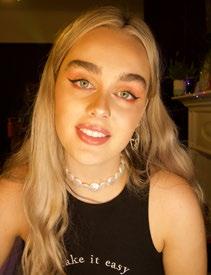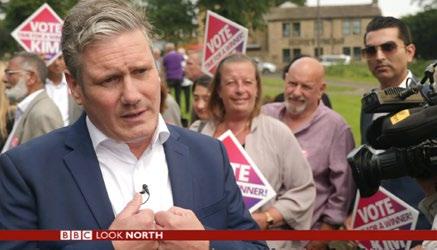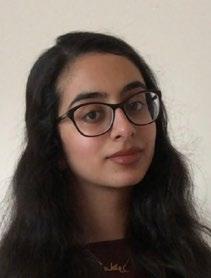
5 minute read
Crimscott Street London SE1 5TP
Love Island
Bouncing back from lockdown
Advertisement
Four RTS bursary scholars recount how their careers have taken off after being derailed by the pandemic

Charly Humphreys
Fifteen months ago, if someone had told me I’d be working in Mallorca on one of the world’s biggest reality shows, I’d have rolled my eyes and said, “You’ve got to be kidding!”
In my final year studying live events and television production at the University of the Arts London, and with Covid-19 still rearing its ugly head, I told myself to stop worrying too much about the future and focus instead on my degree. The virus had imbued me with a strong sense of how unpredictable life could be.
Then, a couple of months ago, I received an offer to work on Love Island. My mentor, the brilliant Lauren Evans at ITV, had passed on my CV to the team that makes Love Island. Lauren is the talent manager at ITV Entertainment.
I was thrilled and ecstatic, to say the least! The day after I submitted my final assignment, I jumped on a plane to the location for one of my favourite shows. I was so excited to see the secrets of its success from the inside.
Initially, I was one of a team of chaperones at a beautiful resort in Mallorca, looking after two wonderful contributors. Inevitably, things were different this year due to the Covid restrictions. I was responsible not only for supporting the contributors’ general well-being but also for making sure that coronavirus guidelines were adhered to at all times.
The job was an absolute dream after my old student life in London, where I’d spent so much time isolating since the start of the pandemic. Travelling and meeting new people are two of my favourite things. It’s been such a positive feeling to experience that part of life again.
Soon after beginning my chaperone gig, I switched roles and moved to the production base to assist with admin,
production and location duties. I worked closely with the production co-ordinator, from whom I learned so much about what it takes to make Love Island the show we love.
I acted as the line of communication across departments. This suited me down to the ground. I met and made friends with a lot of the Spanish and English production staff.
I thrive in busy environments buzzing with lots of people and felt completely in my element. This role gave me such an in-depth insight into how each department operates – and how much collaboration goes into making factual entertainment shows such as Love Island.
I feel very fortunate to have been able to experience working on Love Island. I’ve watched every series and never missed a single episode.
My involvement has provided me with an incredible footing for whatever my next job is, and made me much more confident in my ability to succeed in TV.
I owe huge thanks to my mentors and to the RTS for supporting my journey, and for all the invaluable advice, tips and guidance that has got me to this point.
Coming from a small town near Birmingham, with no creative connections whatsoever, I might not have had the opportunities or confidence to allow me to begin my postgraduate career with a such a bang.
I have no doubt whatsoever that all of the workshops, networking events, panel discussions and peer catch-ups that the RTS bursary scheme opened the door to have all encouraged me to recognise my strengths. I’m so excited to see what comes next.
Charly Humphreys worked on Love Island this summer.

Mahnoor Akhlaq
Once they’ve completed university, every student’s biggest worry is “What’s next?”. I experienced that feeling but, coincidentally, my interview for the BBC Len Tingle placement – a two-month paid internship at BBC Yorkshire – took place on the same day I handed in my final assignment.
Tingle was BBC Yorkshire’s political editor for 17 years until he died, aged 63, in 2018.
I was really hoping I would get the placement as it was the perfect step after completing my journalism degree at the University of Leeds. Subject to Covid-19, I still hope to be studying abroad in September, which is why I didn’t apply for any graduate jobs this year.
It was the third time I had applied for the placement, so I had high hopes. During my first year at uni, I made it through to the interview stage. I didn’t get the placement, but I was told to apply again the following year. Which I did but, due to the pandemic, the placement was cancelled.
When I received the phone call to tell me I’d been accepted I almost couldn’t believe what I was hearing. I was over the moon!
Without the Royal Television Society’s support, I probably wouldn’t be in the position I’m in today. The RTS has supported me in so many different ways.
I can’t put into words how grateful and lucky I am. The bursary helped me to pay for equipment, such as a laptop, camera and microphone. It also supported me while I undertook unpaid work experience.
BBC Yorkshire report contributed to by Mahnoor Akhlaq
BBC

The networking opportunities helped me to build my confidence, contacts and gain a better understanding of how the industry works. I also met my mentor, the BBC journalist Mobeen Azhar, who has been amazing and supportive throughout my final year and gave me invaluable advice for my interview for the placement.
I chose journalism as a career because it allowed me to combine my creative skills with my interest in current affairs. I was also more driven after I learnt about the lack of diversity in the industry, which needs to change.
I am a Pakistani woman born and raised in Bradford, a city that does not always get the best representation in the media. I want to help change that narrative. I think it is important that cities such as Bradford keep talent in the city, which is why I do not want to relocate after I graduate.
I am lucky to be joining the industry at a time when more opportunities are emerging in the North. I am excited to be working in regional news in Yorkshire as I am passionate about sharing local stories about the place where I live.
Due to the pandemic, half my degree took place virtually. As a result, I did not gain the same practical experience. Being able to work across TV, digital and radio, with an amazing team, will help me brush up and develop these skills. I will be making the most of the next eight weeks.
Mahnoor Akhlaq is on the Len Tingle journalism placement at BBC Yorkshire.

